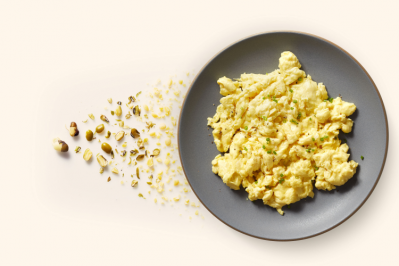Unscrambling the plant-based egg market: Which products have the best functionality for baking?

The plant-based market is expanding. In Europe, the sales value of plant-based alternatives increased nearly 50% in the last two years. In Germany, where ProVeg International is headquartered, the growth rate is as high as 97%.
Sales in plant-based baked goods, however, grew by just 19% during the same period. One of the biggest challenges when it comes to successful plant-based baked goods, according to not-for-profit ProVeg, which aims to halve global animal consumption by 2040, is finding functional egg replacers.
A growing number of plant-based egg replacements have entered the market in recent years. But which ones work best in the kitchen? ProVeg has put at least 15 egg replacement products to the test.
A piece of cake
Specifically, ProVeg wanted to investigate how egg replacers performed when used as a 1:1 replacement in baking, without any changes to recipes or technological adjustments.
The not-for-profit commissioned vegan baking specialist Jens Rötz to test the egg substitutes in a trial recipe: a simple sponge cake made with margarine, sugar, flour, eggs, and baking powder.
The two eggs were replaced by the equivalent quantity of the respective egg alternative, according to the manufacturer’s instructions.
“In this application, the eggs have an emulsifying effect, as well as binding the dough, providing lightness and moisture. In addition, they help to give the finished product its typical taste and colour,” ProVeg explained.
The criteria for the evaluation covered the applicability to the baking process (ratio of the quantity of chicken egg to the quantity of the egg replacer, solubility, soaking time, cohesiveness during stirring, mold release) and the result after the baking process – notably volume, colour, taste and smell.
The number of ingredients in each product was also factored into the final score.

Products tested came from food makers Terra Vegane, Kröner Stärke, Alnatura, Biovegan, Antersdorfer Mühle, Orgran, MyEy - Der vegane Eiersatz, Hammer Mühle, Arche Naturküche, Pure Raw, Follow Your Heart, Crackd, Simply Eggless, Ulrick & Short and Zero Egg.
Who lay the golden eggs?
Rötz selected five egg replacements products that stood out above the rest.
Of the plant-based egg replacements tested, the products that behaved the most like conventional egg in baking – in no particular order – included Kröner Starch REGG-EX offering. Sold in the B2B market, the ‘clean label’ egg is based on selected quality flours and untreated spring water.
Orgran’s No Egg Egg Replacer was also listed amongst the best by the expert baker. Made in Australia, the product is made with ‘all natural’ ingredients and is free from the eight most common food allergies. Rötz said he was impressed by its ‘ease of use’ and performance in the baking process. “In addition, the retail price stands out positively with about 6 cents per egg equivalent.”
Pure Raw’s vegan egg alternative also made the cut. The product is made with ‘very few raw materials’, noted ProVeg, including a ‘specially fermented algae’. Targeting retail and foodservice, the product makes a ‘convincing’ sponge cake in terms of colour, smell and taste.
US-based Simply Eggless’ Plant Based Egg was one of only two liquid egg alternatives tested. The lupin bean-based product scored particularly well in terms of solubility and taste. According to Simply Eggless co-founder Chris Lee, who serves as the company’s marketing director, the goal in developing this egg substitute was to offer a healthier alternative to real eggs, but which binds and leavens like a conventional egg. It would appear Rötz believes the brand has succeeded.
Terra Vegan’s Megga Exx was also judged a high performer. Produced in Berlin, Megga Ex is certified organic, made from potato starch, cassava starch, pea protein, baking powder, and locust bean gum. According to Rötz, the product performed well in solubility, cohesiveness when stirred, and when released from the mold.
Cracking advice
Is there room for improvement in the plant-based egg category for baking? ProVeg believes there most definitely is.
According to its assessment, there is no alternative for chicken egg on the market able to perform as a 1-1 substitute in baked goods without further adaptions.
“So far, none of the examined plant-based products can completely imitate the functionalities of a chicken egg in the sponge cake recipe we used,” noted the non-profit.
“Also, from an economic point of view, most of the investigated alternatives cannot compete with their animal counterparts. They have a selling price of 20 to 75 cents per ‘egg’.

To help accelerate innovation in the plant-based egg alternative space for baking, ProVeg has offered some general advice for newcomers based on its test results.
Firstly, liquid products are more suitable than powdered alternatives. This is because they are easier to dose and do not require a soaking process, which adds time. In addition, they have a similar expiry date to chicken eggs and can be placed next to them in the fridge.
Secondly, ProVeg suggests an egg equivalent should have the same weight as a chicken egg – that is 50-60g. For powder, this means the weight of the egg alternative, plus water, should come to around 55g. “These amounts of liquid are urgently needed for good binding of dough, but is also essential in other recipes, otherwise the final product may be too dry and crumbly,” noted the charity.
Where possible, ProVeg advised against using turmeric for colouring in a commercial setting. If clothing or equipment come into contact with turmeric, they can be very difficult to clean.
Unsurprisingly, the non-profit suggested entrepreneurs use few, but natural, ingredients: “Using few ingredients can be less expensive, and short ingredients lists containing natural ingredients meet the demand of the rising number of customers who live more sustainably and consciously.”
And finally, ProVeg recommended chemical leavening agents be avoided. Baking powder, for example, should not be used because leavening agents are already included in bakery recipes, and it can limit the usability of an egg substitute. Further, the non-profit stressed that if the egg substitute does contain a chemical leavening agent, the bakery must know the exact amount contained. “This amount must then be deducted from the weight of the baking powder in the recipe – an additional expense, which is avoidable.”






















